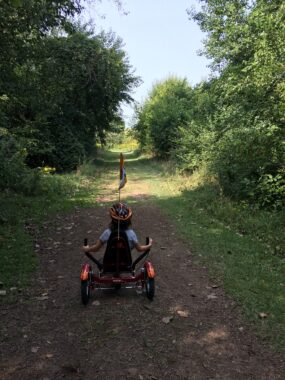Why I’m deciding whether to homeschool my daughter with FA
Will she be safer in our house? I'm torn, despite my list of pros and cons.
Written by |

I looked at both my hands and scoffed. The next 30 minutes were going to be interesting.
I’m an incredibly right-handed person, to the point that my left hand is pretty much just along for the ride. On this morning, my underused left hand was clean while my right had just shaken hands with dozens of strangers. Some of them were coughing, and I didn’t have any hand sanitizer.
Before Amelia, 12, was diagnosed with Friedreich’s ataxia (FA), we knew that illness was a big deal for her. A cold seemed to make her awkward walk even more wobbly. She’d spend days in bed with her fatigue increasing and her fine and gross motor skills decreasing.
Now that I have a better idea of what illness does to her, I’ve gone from being someone who didn’t worry about germs to a person who (usually, anyway) carries hand sanitizer. The recent pandemic made me, as well as most of the globe, more cautious about contagions.
Sitting with my right hand’s possible germs, I had to use my left — and every move involving fine motor skills was awkward. Once again, FA was exerting its grip on my life.
I find myself watching Amelia’s delicate hands reaching out to walls or sliding across handles as she navigates the world in public, and I feel my breath catch. Then she pushes her hair out of her face, and I try not to cringe.
In a life in which I’m often thinking about how I can slow down FA progression while we wait for treatment options, mitigating illnesses and exposure has taken up brain space.
How will we handle school?
In a meeting with the school last spring, I shared concerns about what seemed like Amelia’s revolving door of colds. We were doing all the things at home to try to build up immunity, but we were failing to keep her well. As I talked to parents of children who didn’t have medical concerns, I found that my experience was not unique. Illness seemed to be keeping kids home more.
As the school shared ways to mitigate exposure with me, one option presented was that we move to remote learning during cold and flu season. I wanted to say, “I remember this show from 2020, when we all did remote learning. I’m not sure a sequel is a great idea.”

A young Amelia Hamilton rides her trike on Sept. 15, 2020. (Photo by Elizabeth Hamilton)
I’m still balancing out the decision on homeschooling. The gains and losses of keeping Amelia home have turned into two long lists. Medical professionals have weighed in, and my self-doubt is hovering over the process. Parenting a child with FA always seems to provide challenging opportunities for me to lean into personal growth.
If I’ve learned anything over the years, it’s that I’m not a great teacher for children. I lack the patience needed to foster self-discovery in a developing brain. I also know that school offers more than an education; it also provides socialization, enrichment, a host of interventions with specialists, and exercise, as Amelia still uses a walker in school. It likewise causes fatigue from the noise and exposure to illness.
I’m finding Amelia more and more exhausted at the end of the day and struggling to wake up in the morning. The possibility of homeschooling is a big decision, and I know I’m not the first to wrestle with it.
I have no idea what we’ll do. Stay posted because we’ll have to decide at some point. But just as I can pivot and use my left hand if it’s best for Amelia, I know we can also make adjustments to do what’s needed on the uncertain road ahead.
Note: Friedreich’s Ataxia News is strictly a news and information website about the disease. It does not provide medical advice, diagnosis, or treatment. This content is not intended to be a substitute for professional medical advice, diagnosis, or treatment. Always seek the advice of your physician or another qualified health provider with any questions you may have regarding a medical condition. Never disregard professional medical advice or delay in seeking it because of something you have read on this website. The opinions expressed in this column are not those of Friedreich’s Ataxia News or its parent company, Bionews, and are intended to spark discussion about issues pertaining to Friedreich’s ataxia.







Leave a comment
Fill in the required fields to post. Your email address will not be published.